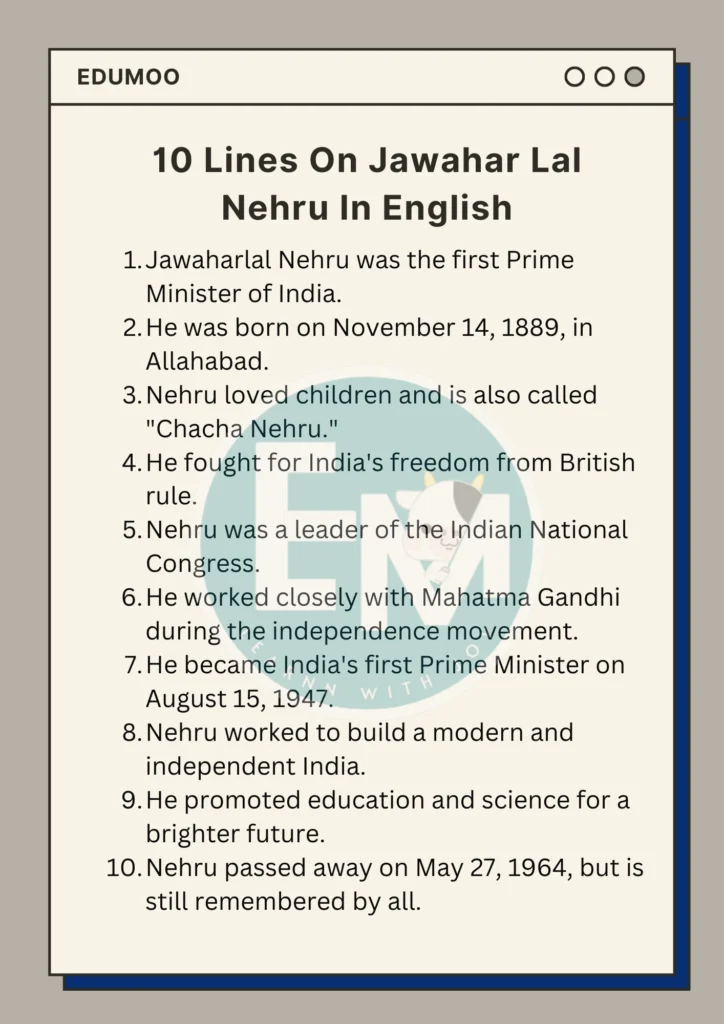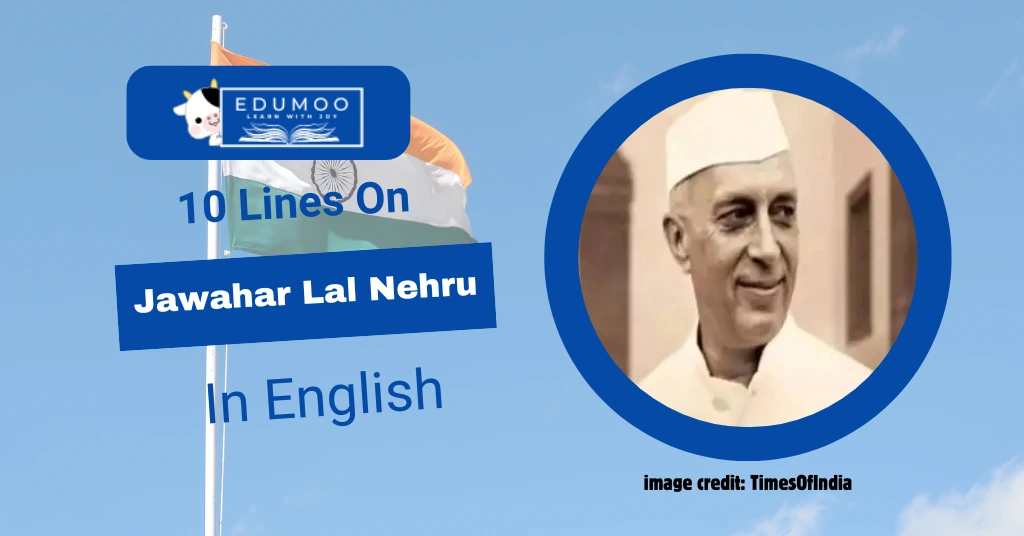Jawaharlal Nehru, known as “Chacha Nehru” by children, was the first Prime Minister of India. Born on November 14, 1889, he played a big role in India’s struggle for independence. His love for children and his work in building a new India make him one of the most respected leaders in Indian history. Nehru focused on education, science, and the development of the country, and his efforts shaped modern India. Learn more about him with 10 Lines On Jawahar Lal Nehru.
10 Lines On Jawahar Lal Nehru In English
- Jawaharlal Nehru was the first Prime Minister of India.
- He was born on November 14, 1889, in Allahabad.
- Nehru loved children and is also called “Chacha Nehru.”
- He fought for India’s freedom from British rule.
- Nehru was a leader of the Indian National Congress.
- He worked closely with Mahatma Gandhi during the independence movement.
- He became India’s first Prime Minister on August 15, 1947.
- Nehru worked to build a modern and independent India.
- He promoted education and science for a brighter future.
- Nehru passed away on May 27, 1964, but is still remembered by all.

Essay On Jawahar Lal Nehru In English In 200 Words
Jawaharlal Nehru was born on November 14, 1889, in Allahabad. He became the first Prime Minister of independent India on August 15, 1947. Nehru played a significant role in the Indian independence movement and worked alongside Mahatma Gandhi to free India from British rule. He believed in democracy and worked towards building a modern, independent nation.
Nehru was known for his love for children and his belief in education. He often said that children are the future of a country. To honor his love for children, his birthday is celebrated as Children’s Day in India every year. Nehru believed that a strong education system would lead to a brighter future for the nation.
As Prime Minister, Nehru focused on industrial development, scientific research, and improving the lives of farmers and workers. He also emphasized the importance of unity in a diverse country like India. He promoted the idea of secularism, where people of all religions live together in harmony.
Jawaharlal Nehru’s efforts laid the foundation for India’s progress. He passed away on May 27, 1964, but his legacy lives on. Nehru’s vision of a progressive and united India continues to inspire people today. His contribution to the nation’s development and his love for children make him one of the most respected leaders in Indian history.
| Also Read: 10 Lines on Chhath Puja In English |
Essay On Jawahar Lal Nehru In English In 950 Words
Jawaharlal Nehru, the first Prime Minister of India, was one of the most important leaders in the history of India. He played a vital role in India’s struggle for independence and worked hard to build the country after it became free from British rule. His life and work have made him one of the most respected and loved figures in Indian history. Nehru is remembered not only for his leadership in the freedom movement but also for his vision of a modern, democratic, and educated India.
Early Life and Education
Jawaharlal Nehru was born on November 14, 1889, in Allahabad, a city in northern India. His father, Motilal Nehru, was a famous lawyer, and his family was very wealthy and influential. Nehru received his early education from private tutors at home. As a young boy, he was very curious and loved to read books. His parents encouraged his interest in learning.
When Nehru was older, he went to England to study at Harrow School and later at the famous Cambridge University. After completing his studies, he went to London to study law at the Inner Temple. These years of education in Europe helped Nehru develop a modern way of thinking. He was deeply influenced by the ideas of democracy, equality, and justice, which he later applied to his work in India.
Role in India’s Freedom Struggle
Nehru’s life changed when he returned to India and became involved in the Indian freedom movement. He joined the Indian National Congress (INC), a political party that was fighting for India’s independence from British rule. During this time, Nehru met many important leaders, including Mahatma Gandhi, who became his mentor and guide. Gandhi’s ideas of non-violent resistance influenced Nehru deeply.
Nehru believed that India should be free from British rule, and he worked hard to bring about that freedom. He was part of many protests and movements against the British. Nehru was arrested many times for participating in the freedom struggle. Despite being in jail several times, he never gave up the fight for independence. He was determined to see India free and independent.
In 1942, when the Quit India Movement was launched by Gandhi, Nehru played a key role in organizing protests and encouraging people to join the movement. The British arrested many leaders, including Nehru, but the movement continued to gain strength. After years of struggle, India finally achieved independence on August 15, 1947.
Becoming the First Prime Minister of India
After India gained independence, Jawaharlal Nehru became the first Prime Minister of the country. This was a very important moment in India’s history. Nehru was given the task of leading a newly independent country. At that time, India was facing many challenges, such as poverty, illiteracy, and a lack of development. Nehru had a clear vision for India’s future and wanted to make the country strong, independent, and modern.
Nehru worked hard to solve India’s problems. He set up programs to improve the country’s economy, education, and healthcare. He encouraged the development of industries and science and technology. Nehru also wanted to bring unity to India, which was made up of many different languages, cultures, and religions. He believed that despite these differences, India could become a strong and united country.
Nehru’s Contributions to India
One of the major contributions of Nehru was his emphasis on education. He believed that education was the key to India’s progress. Nehru worked to build schools and universities all over India. He also encouraged scientific research and the development of new technologies. Under his leadership, India saw the establishment of institutions like the Indian Institutes of Technology (IITs) and the Indian Space Research Organisation (ISRO), which later became important for the country’s progress in science and technology.
Nehru also focused on improving the country’s infrastructure, such as roads, electricity, and communication. He wanted to make sure that all parts of India, even the remote villages, could benefit from development. He also promoted heavy industries, such as steel plants and factories, which helped in creating jobs and strengthening the economy.
Another important aspect of Nehru’s leadership was his foreign policy. He believed in the idea of non-alignment, which meant that India would not take sides in the Cold War between the United States and the Soviet Union. Nehru wanted India to be free to make its own decisions and maintain peace in the world. He also worked to strengthen relations with other countries, especially in Asia, and helped in the formation of the Non-Aligned Movement (NAM).
Nehru’s Love for Children
Jawaharlal Nehru was known for his deep love for children. He always said that children were the future of the nation. He wanted to ensure that every child in India received a good education and had a bright future. To honor his love for children, his birthday, November 14, is celebrated as Children’s Day in India.
Nehru spent a lot of time with children and encouraged them to dream big and work hard. He believed that children should be given the freedom to explore their talents and interests. Today, Nehru is remembered by children across India as “Chacha Nehru” for his love and care for them.
Legacy and Conclusion
Jawaharlal Nehru passed away on May 27, 1964, but his legacy continues to live on. His efforts in building a strong, democratic, and educated India have had a lasting impact. Nehru’s vision of a progressive India has shaped the country’s development in the years since his death. His ideas and leadership have inspired generations of leaders and citizens.
Nehru is remembered not only as the first Prime Minister of India but also as a great leader who laid the foundation for a modern, united, and democratic India. His contributions to education, science, industry, and peace are still relevant today. Jawaharlal Nehru will always be remembered as a man who dedicated his life to serving the people of India and building a better future for the nation.
Conclusion
Today, we have learnt 10 lines on Jawahar Lal Nehru. Jawaharlal Nehru’s contribution to India’s freedom and development is unforgettable. As a leader, he worked to create a better India for all its citizens. His vision for a strong and educated nation continues to inspire generations. We remember Nehru not only for his leadership but also for his love for children, making him a true hero in the hearts of many.

